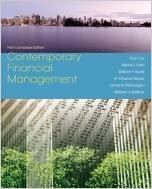Answered step by step
Verified Expert Solution
Question
1 Approved Answer
CAPITAL BUDGETING: APPLICATIONS OF INVESTMENT DECISION TECHNIQUES Educational material supplied by The Case Centre Copyright encoded A 7 6 HM - JUJ 9 K -
CAPITAL BUDGETING: APPLICATIONS OF
INVESTMENT DECISION TECHNIQUES
Educational material supplied by The Case Centre
Copyright encoded AHMJUJKPJMNI
CAPITAL BUDGETING: APPLICATIONS OF INVESTMENT DECISION
TECHNIQUES
Making a capital budgeting decision is one of the most important policy decisions that a
firm makes. A firm that does not invest in longterm investment projects does not
maximize stakeholder wealth. Capital budgeting decisions determine the future of the
company. An appropriate investment decision can yield spectacular returns. On the other
hand, a misguided and incorrect decision can endanger the very survival of the firm. A
few wrong decisions and the firm may be forced into bankruptcy.
Capital budgeting decisions generally are either replacement decisions or expansion
decisions. Replacement decisions are for purchasing of assets to replace existing assets
that might be worn out, damaged or obsolete. Expansion decisions are made to add
capital projects to the existing assets so as to produce either more of its existing products
or entirely new products. Capital budgeting decisions are deciding which projects a firm
should accept and which it should reject. Various capital budgeting techniques like
payback, discounted payback, net present value NPV internal rate of return IRR and
profitability index may be used to arrive at the most suitable decisions.
Al Mansouri Enterprises is a fast growing firm in Dubai, with the practice of investing
in a few profitable projects each year. For this year the operations manager Mr
Mohamed has identified seven projects listed in Exhibit and makes a presentation to
the management committee. Mr Aly, the CEO of the firm is impressed with the
projects but the finance manager Ms Hadad raises the concern that the funds available
with the firm for investments are limited to AED million. Then, the CEO asks the
finance manager to select the best projects from these seven, keeping in mind the
constraints of finance at the firms disposal.
Ms Hadad, the finance manager of the firm is seeking your help requesting you to
recommend the best projects that the firm should accept. To keep it simple, you are
required to consider only the quantitative factors for the selection of the projects. That
is no other project characteristics are relevant in the selection, except that the
management has determined that projects and are mutually exclusive. The firm is
also not interested in going for further borrowing. Refer to your weekly content for
guidance of your analysis.
This case is compiled from published sources, and is intended to be used as a basis for
ta financial assignment rather than to illustrate effective or ineffective handling of
management situation. The firm name, characters, projects and cash flows are
fictional.
Educational material supplied by The Case Centre
Copyright encoded AHMJUJKPJMNI
EXHIBIT Project Free Cash Flows UAE Dirhams in thousands
Project number
Year
GBP AED The case has four primary learning objectives:
Explain the mechanisms of capital investment decisions.
Identify the appropriate investment decision techniques suiting the characteristics of the projects.
Apply the capital investment decision techniques on seven projects with different cash outlays.
Demonstrate the ability to evaluate the various capital investment projects and make decisions based on their merits, and availability of funds capital rationing
Task
After reviewing the appropriate readings and learning materials, please answer the given questions of the selected case study:
Rank the projects simply by inspecting the cash flows you must calculate the sum of cashflow benefits and the excess of cash inflows over cash outflows
Rank the projects using two quantitative methods: NPV and IRR. Assume that all projects are from the same risk class and the appropriate discount rate is Briefly explain the two methods and specify which quantitative ranking methods are better, and why.
Compare the ranking obtained by the two methods with the ranking obtained by simple inspection of the cash flows. Do they differ? Explain the reasons why they differ or not.
Recommend the best projects that the firm should accept when the funds available are limited to AED million, and Project and Project are mutually exclusive.
Step by Step Solution
There are 3 Steps involved in it
Step: 1

Get Instant Access to Expert-Tailored Solutions
See step-by-step solutions with expert insights and AI powered tools for academic success
Step: 2

Step: 3

Ace Your Homework with AI
Get the answers you need in no time with our AI-driven, step-by-step assistance
Get Started


